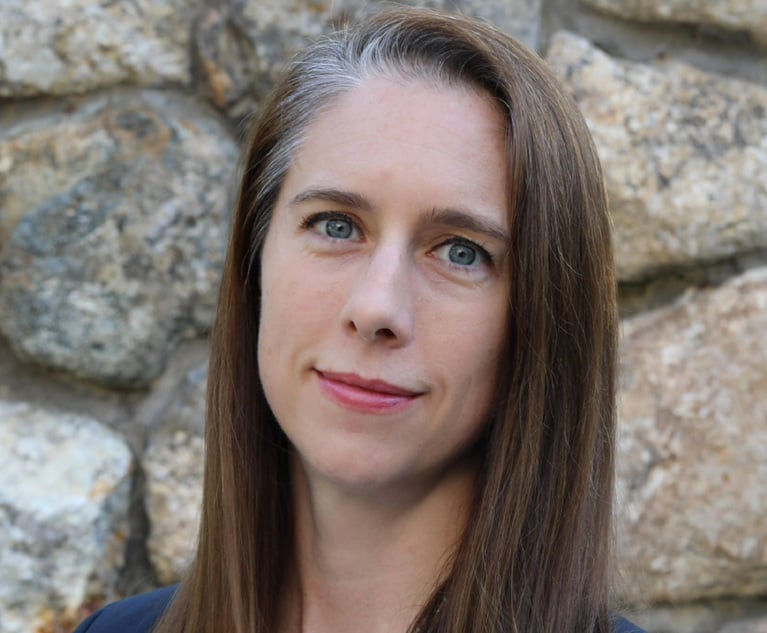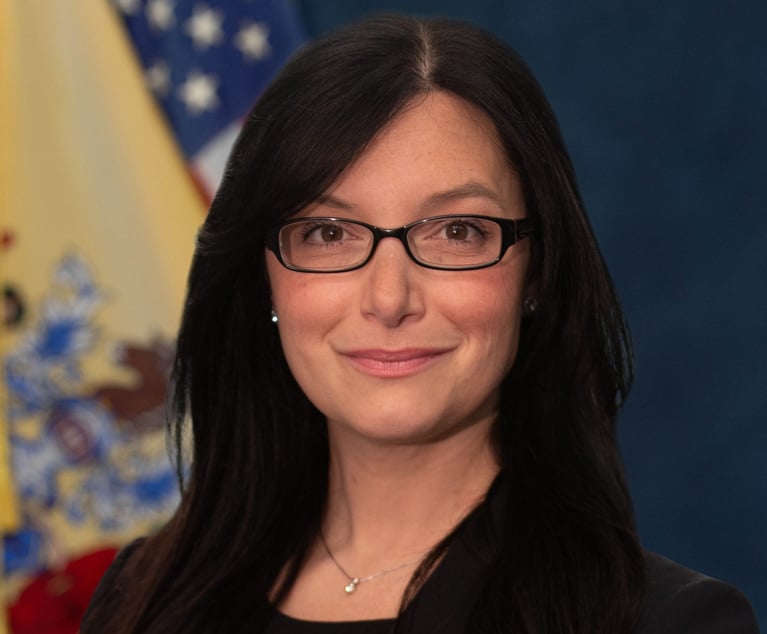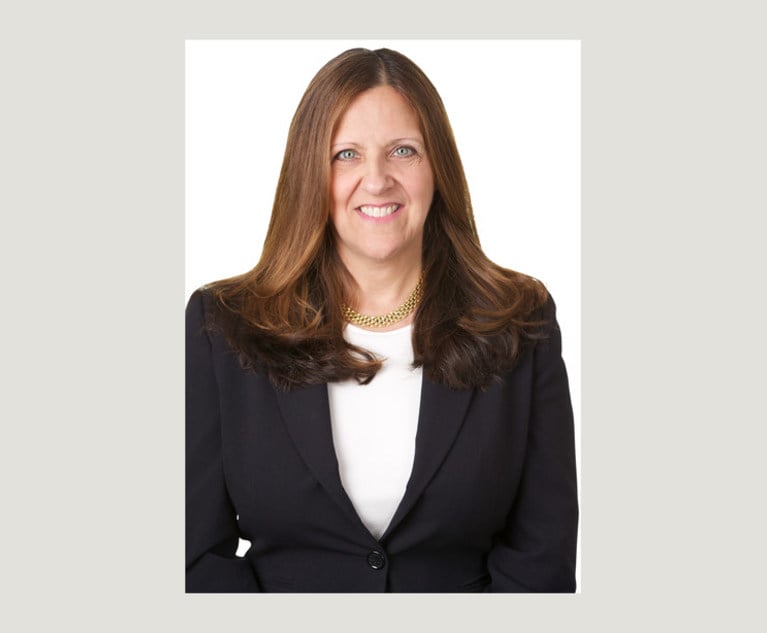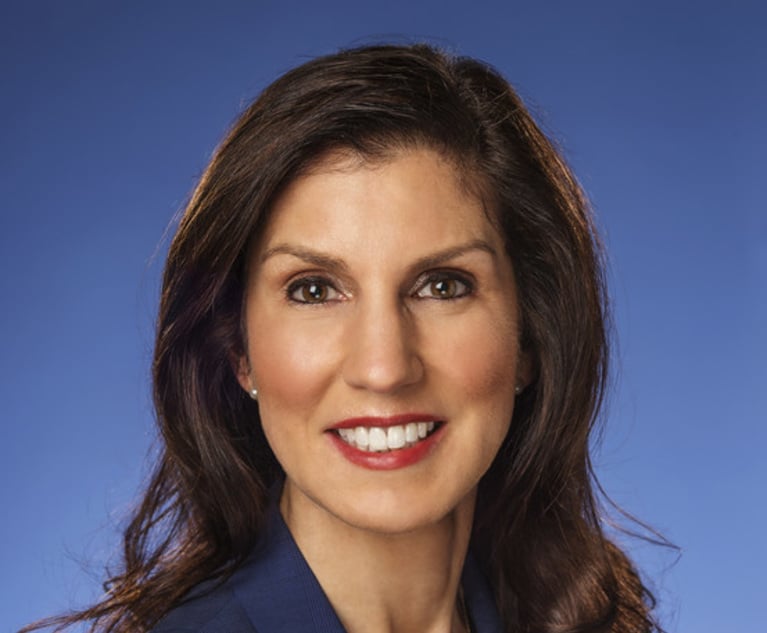 Edward Snyder of Snyder Sarno D'Aniello Maceri & da Costa
Edward Snyder of Snyder Sarno D'Aniello Maceri & da CostaNo Cookie Cutter in Legal Practice, Edward Snyder of Snyder Sarno Says
"It is through the mentorship of future generations that we can have an exchange of ideas and blend the innovations of today with the experience and wisdom of yesterday. ... In order to ensure the field is growing in beneficial ways, we must be cognizant not only of the future, but of the past."
June 10, 2019 at 05:56 PM
4 minute read
Edward Snyder of Snyder Sarno D'Aniello Maceri & da Costa in Roseland has made a name for himself as a matrimonial lawyer over the course of his 50-plus-year career, but he's also made a name for himself as a mentor. A colleague said: “As a member of the firm since our inception, he has acted as a mentor to our entire firm. His accolades are a testament to his hard work and dedication, but it is his personal connection to the firm that truly showcases his love for the law. Mr. Snyder goes above and beyond to mentor anyone seeking to learn, he is welcoming and always available for guidance. He becomes personally invested in our lawyers, ensuring the health and happiness of the entire firm.”
Is the role of mentor one that you set out to take, or one you happened into?
I have been a practicing matrimonial lawyer for over 50 years and still work full time. I am selective as to the cases I accept; most of which are high asset or high conflict. This leaves me with time to serve as a mentor to younger family law attorneys both inside and outside of my firm. I have been privileged to mentor many amazing people.
Why are mentors so important in the legal profession?
It is through the mentorship of future generations that we can have an exchange of ideas and blend the innovations of today with the experience and wisdom of yesterday. Like all professions, the legal profession will continue to grow and develop over time. In order to ensure the field is growing in beneficial ways, we must be cognizant not only of the future, but of the past.
Good mentors often have learned from good examples. Who are some people you have mentored you?
One of the first matrimonial lawyers that I worked for was Monroe Ackerman, who was considered one of the top lawyers in the field. I was so lucky to have Monroe as a mentor and a teacher. He taught me how to interact with judges, colleagues and clients. I also learned early on that the practice of law is a business and should be treated like one. There were others who mentored me, including Judge Tom Zampino, who today is my partner, and sometimes I try to mentor him. What goes around comes around! I also try to mentor my partner Angelo Sarno, but it seems that he teaches me more than I teach him.
Law is, for many, more than a full-time job. How does one create time for mentorship?
Creating time for mentorship comes very organically. I never set out to be a mentor, it happened as I continued to work with new people and experience new ideas. Each case needs to be treated uniquely, and a strategy must be developed for that case. There is no cookie-cutter mold to the profession—because of this, it is important to continuously develop new ideas and strategies. It is through the pursuit of new strategies that collaboration and mentorships form.
How are the business and profession of law changing, and are New Jersey lawyers well-positioned for the future?
The profession was created to provide a system that can enforce the ideals of our society and the rule of law. As society progresses, so does the law. Adaptation and evolution through mentorship and collaboration allow the profession to develop and protect society from problems that arise. I have argued before the New Jersey Supreme Court several times, including Konzelman v. Konzelman, which is the leading decision on cohabitation. I represented the prevailing party, who was successful in having his alimony award vacated. I've also argued before the Appellate Division on innumerable occasions, most recently, I represented the successful party in the published Appellate Division opinion of Slutsky v. Slutsky, which provided the matrimonial bar with a primer on how to value a partner's interest in a big law firm.
As an attorney, it is important to recognize the client's needs and what is fair. I devote considerable time and energy to my clients. And, I expect to be doing this for many years to come.
This content has been archived. It is available through our partners, LexisNexis® and Bloomberg Law.
To view this content, please continue to their sites.
Not a Lexis Subscriber?
Subscribe Now
Not a Bloomberg Law Subscriber?
Subscribe Now
NOT FOR REPRINT
© 2024 ALM Global, LLC, All Rights Reserved. Request academic re-use from www.copyright.com. All other uses, submit a request to [email protected]. For more information visit Asset & Logo Licensing.
You Might Like
View All
For Lawyers, the 'Work' of Making an Impact Does Not Have to Happen in a Courtroom. Laura E. Sedlak Says

Doing the Right Thing in the Pursuit of Justice Requires Guts, Says Lyndsay Ruotolo

One Can be Most Impactful When Their Pursuits Are Driven by Their Concerns and Passions, Says Sherilyn Pastor

As a Lawyer, You Have a Powerful Way to Make an Impact, Says Mary Frances Palisano
Trending Stories
Who Got The Work
Michael G. Bongiorno, Andrew Scott Dulberg and Elizabeth E. Driscoll from Wilmer Cutler Pickering Hale and Dorr have stepped in to represent Symbotic Inc., an A.I.-enabled technology platform that focuses on increasing supply chain efficiency, and other defendants in a pending shareholder derivative lawsuit. The case, filed Oct. 2 in Massachusetts District Court by the Brown Law Firm on behalf of Stephen Austen, accuses certain officers and directors of misleading investors in regard to Symbotic's potential for margin growth by failing to disclose that the company was not equipped to timely deploy its systems or manage expenses through project delays. The case, assigned to U.S. District Judge Nathaniel M. Gorton, is 1:24-cv-12522, Austen v. Cohen et al.
Who Got The Work
Edmund Polubinski and Marie Killmond of Davis Polk & Wardwell have entered appearances for data platform software development company MongoDB and other defendants in a pending shareholder derivative lawsuit. The action, filed Oct. 7 in New York Southern District Court by the Brown Law Firm, accuses the company's directors and/or officers of falsely expressing confidence in the company’s restructuring of its sales incentive plan and downplaying the severity of decreases in its upfront commitments. The case is 1:24-cv-07594, Roy v. Ittycheria et al.
Who Got The Work
Amy O. Bruchs and Kurt F. Ellison of Michael Best & Friedrich have entered appearances for Epic Systems Corp. in a pending employment discrimination lawsuit. The suit was filed Sept. 7 in Wisconsin Western District Court by Levine Eisberner LLC and Siri & Glimstad on behalf of a project manager who claims that he was wrongfully terminated after applying for a religious exemption to the defendant's COVID-19 vaccine mandate. The case, assigned to U.S. Magistrate Judge Anita Marie Boor, is 3:24-cv-00630, Secker, Nathan v. Epic Systems Corporation.
Who Got The Work
David X. Sullivan, Thomas J. Finn and Gregory A. Hall from McCarter & English have entered appearances for Sunrun Installation Services in a pending civil rights lawsuit. The complaint was filed Sept. 4 in Connecticut District Court by attorney Robert M. Berke on behalf of former employee George Edward Steins, who was arrested and charged with employing an unregistered home improvement salesperson. The complaint alleges that had Sunrun informed the Connecticut Department of Consumer Protection that the plaintiff's employment had ended in 2017 and that he no longer held Sunrun's home improvement contractor license, he would not have been hit with charges, which were dismissed in May 2024. The case, assigned to U.S. District Judge Jeffrey A. Meyer, is 3:24-cv-01423, Steins v. Sunrun, Inc. et al.
Who Got The Work
Greenberg Traurig shareholder Joshua L. Raskin has entered an appearance for boohoo.com UK Ltd. in a pending patent infringement lawsuit. The suit, filed Sept. 3 in Texas Eastern District Court by Rozier Hardt McDonough on behalf of Alto Dynamics, asserts five patents related to an online shopping platform. The case, assigned to U.S. District Judge Rodney Gilstrap, is 2:24-cv-00719, Alto Dynamics, LLC v. boohoo.com UK Limited.
Featured Firms
Law Offices of Gary Martin Hays & Associates, P.C.
(470) 294-1674
Law Offices of Mark E. Salomone
(857) 444-6468
Smith & Hassler
(713) 739-1250






